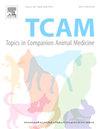Traumatic brain injury in companion animals: Pathophysiology and treatment
IF 1.3
3区 农林科学
Q2 VETERINARY SCIENCES
引用次数: 0
Abstract
Traumatic brain injuries (TBI) are common in dogs and cats that have sustained head trauma from a variety of causes. In moderate to severe TBI, damage from both the primary and secondary injuries can be life-threatening. TBI management may be further complicated by concurrent injuries in polytrauma patients. Thorough initial and serial examinations are key in detecting neurologic changes quickly and guiding treatment. Intensive treatments such as nursing care, fluid therapy, hyperosmolar agents, analgesia, sedation, anticonvulsants, oxygen supplementation, surgery, and rehabilitation may be employed in TBI management. Prognostication resources for an individual patient are limited and a perceived poor prognosis may worsen clinical outcomes. In this paper, we review the pathophysiology of TBI, identification, injury stratification and prognosis of patients with TBI as well as propose treatment and monitoring recommendations for companion animals based on severity of TBI.
伴侣动物的创伤性脑损伤:病理生理学与治疗。
创伤性脑损伤 (TBI) 常见于因各种原因造成头部外伤的猫狗。在中度到重度创伤性脑损伤中,原发性和继发性损伤都可能危及生命。多发性创伤患者的并发伤可能会使创伤性脑损伤的治疗变得更加复杂。彻底的初步检查和连续检查是迅速发现神经系统变化并指导治疗的关键。在治疗创伤性脑损伤时,可采用护理、液体疗法、高渗剂、镇痛、镇静、抗惊厥、补氧、手术和康复等强化治疗。针对个体患者的预后诊断资源是有限的,预后不良可能会恶化临床结果。本文回顾了创伤性脑损伤的病理生理学、创伤性脑损伤患者的识别、损伤分层和预后,并根据创伤性脑损伤的严重程度为伴侣动物提出了治疗和监测建议。
本文章由计算机程序翻译,如有差异,请以英文原文为准。
求助全文
约1分钟内获得全文
求助全文
来源期刊

Topics in companion animal medicine
农林科学-兽医学
CiteScore
2.30
自引率
0.00%
发文量
60
审稿时长
88 days
期刊介绍:
Published quarterly, Topics in Companion Animal Medicine is a peer-reviewed veterinary scientific journal dedicated to providing practitioners with the most recent advances in companion animal medicine. The journal publishes high quality original clinical research focusing on important topics in companion animal medicine.
 求助内容:
求助内容: 应助结果提醒方式:
应助结果提醒方式:


